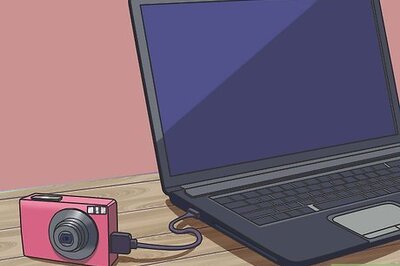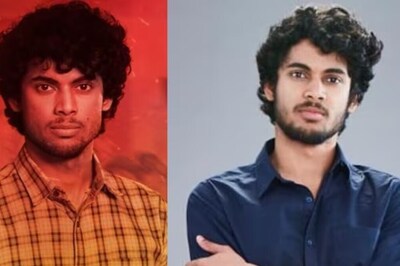
views
Does cinema influence life? Or, is it the other way round? This debate has been raging perhaps ever since we found the means to make pictures move, a hundred years ago and more.
The recent news story on the anti-hijab sentiment in Iran caught my attention. An Associated Press report had this to say: “The simple act of walking has become a display of defiance for a young Iranian woman who often moves in Teheran's streets without the compulsory headscarf or hijab. With every step, she risks harassment or arrest by Iran's morality police whose job is to enforce the strict dress code imposed after the 1979 Islamic Revolution”.
And the debate on to wear or not to wear the hijab has polarised Iranian society in a way that nothing else has in a long, long time.
During my many trips to the Marrakech International Film Festival in Morocco – a fairly liberal country – there were many young women who sported the headscarf and told me in reply to my question that they did so voluntarily. There was no compulsion, and the Moroccan rulers were quite okay with the idea of their women being seen in public without the hijab. Yes, there were a few who belonged to the non-hijab group, and they said that one of their inspiration to be sans the scarf was Golshifteh Farahani.
Farahani is a remarkable Iranian actress and an equally remarkable woman who created a storm in Teheran in the early years of 2000 – when she was barely a teen. She was born with the streak of the rebel in her. At school, she led a protest demanding that classrooms be heated during the city's bitter winter. And when the school did not pay heed, she decided to generate her own form of heat. She began playing Cupid carrying letters from her girlfriends at school to their lovers. Obviously, this courier service must have been busted.
But who is to stop Golshifteh? When custom and religion and the mullahs demanded that she wears a hijab, she found a way out. She tonsured her head. I do not have any hair. What do I cover, she gleefully quipped.
And not just this: she cycled the streets of the capital city throwing a religious diktat to the winds. In Iran, girls and women were not allowed to cycle.
Then came cinema and with it greater confidence and a much more urgent sense of fearlessness. While she did act in some marvellous works – like The Pear Tree, About Elly, Chicken with Plums, The Patience Stone (in which her scandalous ramblings about her sexual escapades jolts her husband out of his comatose state) and The Song of Scorpions (with Irrfan Khan, directed by Anup Singh and set on the sands of Rajasthan), -- she also made movies that infuriated the Iranian clergy. Her Body of Lies in 2008 with Leonardo di Caprio – which was critical of the CIA having overthrown Iran's last freely elected Government in 1953 – was intensely disliked by Teheran.
Later, with Farahani going topless for a French fashion magazine in Paris and her choice of dress for functions in the West seemed too much for the religious leaders to digest. After one of her overseas trips, they banned her from entering Iran, and she has since then been living in Paris -- the city of liberty as describes it.
In a 2012 article in The Guardian, she opened her heart out: Farahani insists, however, that she did not set out to shock or provoke. "I hate politics. It is not my job. As always, something you do for nothing becomes political. I knew it would be difficult. But I am living in France now, I have to work here, and either I am living here or I am not."
"It was a big shock for me and my family and for the whole of Iranian society when the ban happened. The good thing is it started a huge debate that could never have happened before. I was there watching people insult me, others answering them, others defending me, others attacking again."
"There were lots of fights within families. Young people especially saw who they were through this debate, and they saw the reality of people they were trusting in."
After all this nasty controversy, when her parents (her father was a renowned theatre artist) went to a wedding, the article continues quoiting the actress: “Everyone from all the generations came to them and held their hands and said: 'Don't be sad. We love Golshifteh.' My mother started crying. That is the beauty of Iran and that is why I am so proud of being an Iranian, especially the women."
But Farahani doesn't want to be a "Joan of Arc, an actress 'with a story', an exotic victim of persecution. “Exile is like death. You cannot understand it until it happens to you. The whole world wants to see you as a victim and they push you to be even more a victim because they see you miserable and they feel good. That is why French people are so obsessed with causes like Syria. It is a kind of pornography to make them feel better about being themselves, but they don't give a shit."
But that said, she is hugely grateful to France. "For the first time in my life I appreciated being a woman. Paris is a city that liberates you as a woman from all your sins that you think you are guilty of, it washes away all of that and you are free."
And, now, perhaps Golshifteh is inspiring women in her own country to feel free and liberated. As Associated Press report added, many women were stopping short of outright rebellion. They were using loosely draped colourful scarves that revealed more hair than they covered!
Farahani really resents the way the Iranian State has been throttling free speech and artists. But they cannot be silenced for long, she adds.
I have seen this. The legendary Iranian director, Jafar Panahi, has been living under some sort of house arrest and has been forbidden to make films. But even in this kind of existence, he managed to make three movies – all on the sly – and one of them, Taxi, went on to win the Golden Bear at 2015 Berlin.
Farahani would smile at this and quip, see! In another interview on the sets of The Song of Scorpions, she averred: "Right now, my generation is forced to live the life we did not choose. And that can be a fatal. We did not have anything to do with the Revolution, but have been forced to bear its ramifications. However, I am optimistic that our generation would be the page-turners. We are bound to be the renaissance generation that will break everything. We may get shattered, but we will change the course”.
Maybe, the first signs are already there on the streets of Teheran.
(Gautaman Bhaskaran is author, commentator and movie critic)



















Comments
0 comment